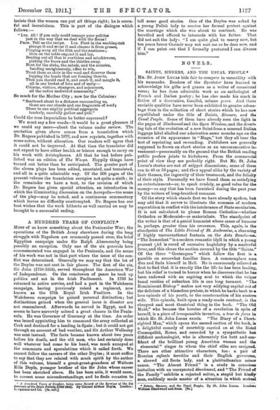A HUNDRED YEARS OF CONFLICT.* Mom. of us know something
about the Peninsular War; the operations of the British Army elsewhere during the long struggle with Napoleon are commonly passed over, the brief Egyptian campaign under Sir Ralph Abercromby being possibly an exception. Only one of the six generals here commemorated was engaged in the Peninsula, and the scene of his work was not in that part where the issue of the con- flict was determined. Generally we may say that the lot of the Doyles was not cast in fair places. The first of the six, Sir John (1750-1834), served throughout the American War of Independence. On the conclusion of peace he took up polities and sat in the Irish Parliament. In 1793 he returned to active service, and bad a part in the Walcheren campaign, having previously raised a regiment, now known as the 87th Royal Irish Fusiliers. In the Walcheren campaign he gained personal distinction; but distinctions gained when the general issue is disaster are not remembered. Afterwards he served in Egypt, and he seems to have narrowly missed a great chance in the Penin- sula. He was Governor of Guernsey at the time. An order was issued appointing him to command the army collected at Cork and destined for a landing in Spain ; but it could not get through on account of bad weather, and Sir Arthur Wellesley was sent instead. The facts became known about two years before his death, and the old man, who had certainly done well whatever had come to his hand, was much annoyed at the comments and speculations which it called forth. We cannot follow the careers of the other Doylea; it must suffice to say that they are related with much spirit by the author of this volume, himself a great-great-grandson of Welbore Eilis Doyle, younger brother of the Sir John whose career has been sketched above. He has been able, it would seem, to correct some misunderstandings, and he finds occasion to
A Hundred Years of Cort, being some Record of the &micas of the Sin Generate °ph. Doyle Amax 1f50-1858). By Colonel Arthur Doyle. London : In.tgmans and Co. Lea. net. tell some good stories. One of the Doylea was asked by a young Polish lady to receive her formal protest against the marriage which she was about to contract. He was horrified and offered to intercede with her father. That did not suit the lady: " I am quite glad to marry now, but ten years hence Casimir may not suit me as he does now, and if I can point out that I formally protested I can divorce him."


































 Previous page
Previous page